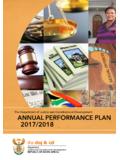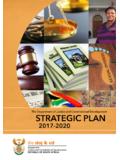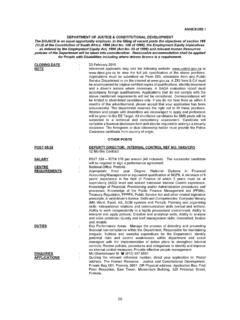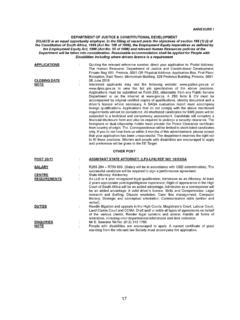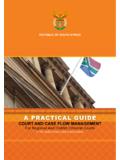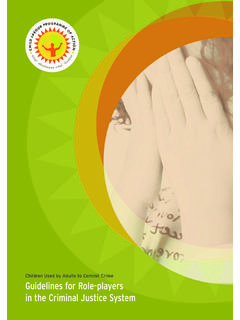Transcription of and MINISTER FOR JUSTICE AND CONSTITUTIONAL …
1 CONSTITUTIONAL COURT OF SOUTH AFRICA [2011] ZACC 23 Case CCT 53/11 In the matter between: JUSTICE ALLIANCE OF SOUTH AFRICA Applicant and PRESIDENT OF THE REPUBLIC OF SOUTH AFRICA First Respondent MINISTER FOR JUSTICE AND CONSTITUTIONAL development Second Respondent CHIEF JUSTICE SANDILE NGCOBO Third Respondent and Case CCT 54/11 In the matter between: FREEDOM UNDER LAW Applicant and PRESIDENT OF THE REPUBLIC OF SOUTH AFRICA First Respondent DIRECTOR-GENERAL: JUSTICE AND CONSTITUTIONAL development Second Respondent MINISTER FOR JUSTICE AND CONSTITUTIONAL development Third Respondent CHIEF JUSTICE SANDILE NGCOBO Fourth Respondent and Case CCT 62/11 In the matter between: CENTRE FOR APPLIED LEGAL STUDIES First Applicant COUNCIL FOR THE ADVANCEMENT OF THE SOUTH AFRICAN CONSTITUTION Second Applicant and PRESIDENT OF THE REPUBLIC OF SOUTH AFRICA First Respondent MINISTER FOR JUSTICE AND CONSTITUTIONAL development Second Respondent CHIEF JUSTICE SANDILE NGCOBO Third Respondent and NATIONAL ASSOCIATION OF DEMOCRATIC LAWYERS First Amicus Curiae BLACK LAWYERS ASSOCIATION Second Amicus Curiae MARIO GASPARE ORIANI-AMBROSINI MP Third Amicus Curiae Heard on : 18 July 2011 Decided on : 29 July 2011 JUDGMENT THE COURT: THE COURT 3 Introduction [1] The three applications for direct access before us arise from a decision by the President of the Republic of South Africa to extend the term of office of the Chief JUSTICE of South Africa for five years.
2 They were all brought during the court recess and heard together. All the applicants challenge the constitutionality of the law that authorises the process by which the term of office of the Chief JUSTICE was extended and, if the law is found to be valid, put in issue the CONSTITUTIONAL validity of the conduct of the President in the process of extending that term of office. Background [2] Before its amendment in 2001,1 section 176 of the Constitution provided that a CONSTITUTIONAL Court judge is appointed for a non-renewable term of 12 years but must retire at the age of 70. The 2001 amendment did not alter the term of appointment of a CONSTITUTIONAL Court judge but gave Parliament the power to extend the term of office of a CONSTITUTIONAL Court judge. Section 176(1) now provides: A CONSTITUTIONAL Court judge holds office for a non-renewable term of 12 years, or until he or she attains the age of 70, whichever occurs first, except where an Act of Parliament extends the term of office of a CONSTITUTIONAL Court judge.
3 1 Constitution of the Republic of South Africa Amendment Act 34 of 2001 (2001 amendment). THE COURT 4 [3] Section 4 of the Judges Remuneration and Conditions of Employment Act2 (Act) provides that a CONSTITUTIONAL Court judge, whose 12-year term of office expires or who reaches the age of 70 years before completing 15 years active service, must continue in office until the completion of 15 years active service or until that judge attains the age of 75 years, whichever is the [4] Section 8(a) of the Act4 provides: 2 47 of 2001. 3 Section 4 provides: (1) A CONSTITUTIONAL Court judge whose 12-year term of office as a CONSTITUTIONAL Court judge expires before he or she has completed 15 years active service must, subject to subsection (2), continue to perform active service as a CONSTITUTIONAL Court judge to the date on which he or she completes a period of 15 years active service, whereupon he or she must be discharged from active service as a CONSTITUTIONAL Court judge.
4 (2) A CONSTITUTIONAL Court judge who, on attaining the age of 70 years, has not yet completed 15 years active service, must continue to perform active service as a CONSTITUTIONAL Court judge to the date on which he or she completes a period of 15 years active service or attains the age of 75 years, whichever occurs first, whereupon he or she must be discharged from active service as a CONSTITUTIONAL Court judge. This provision applied to the judges who were members of this Court at the time of its enactment, including Chief JUSTICE Chaskalson. 4 This provision in substance re-enacted section 7A of the Judges Remuneration and Conditions of Employment Act 88 of 1989. Section 7A of that Act came into force on 7 July 1993, before the 1993 Constitution was adopted. Section 7A provided: (1) A Chief JUSTICE who has been discharged from active service, except a Chief JUSTICE who has been discharged from active service in terms of section 3(1)(b), (c) or (d), may, at the request of the State President, from the date on which he has been discharged from active service, perform service as Chief JUSTICE of South Africa for a period determined by the State President, which shall not extend beyond the date on which such Chief JUSTICE attains the age of 75 years.
5 (2) A Chief JUSTICE who performs service in terms of subsection (1) shall monthly be paid such remuneration as the State President may determine. The 1993 amendment was occasioned by the controversial circumstances under which Chief JUSTICE Rabie agreed to stay on in office, after reaching retirement age, despite the absence of statutory warrant or precedent for doing so. See Cameron Nude monarchy: the case of South Africa s judges (1987) 3 South African Journal on Human Rights 338 at 343-6. THE COURT 5 A Chief JUSTICE who becomes eligible for discharge from active service in terms of section 3(1)(a) or 4(1) or (2), may, at the request of the President, from the date on which he or she becomes so eligible for discharge from active service, continue to perform active service as Chief JUSTICE of South Africa for a period determined by the President, which shall not extend beyond the date on which such Chief JUSTICE attains the age of 75 years.
6 [5] In effect, section 8(a) permits the further extension of the term of office of the Chief JUSTICE exclusively. It allows a Chief JUSTICE , whose 12-year term in this Court is to expire and who will have completed 15 years active service, to remain the Chief JUSTICE of South Africa at the request of and for a period determined by the President. [6] The 12-year term of office of the incumbent Chief JUSTICE expires at midnight on 14 August He will also have completed more than 15 years active judicial service by this It follows that the Chief JUSTICE cannot continue in office beyond midnight on 14 August 2011 unless his term of office is validly extended before that date. [7] On 11 April 2011 the President requested the Chief JUSTICE in writing to remain in office for an additional period of five years: Dear Chief JUSTICE Ngcobo 5 The Chief JUSTICE was appointed to the office of a CONSTITUTIONAL Court judge with effect from 15 August 1999.
7 The Act makes no provision for the computation of time. The civilian method accordingly applies. It follows that his term of office expires at midnight on 14 August 2011. See Ex parte MINISTER of Social development and Others [2006] ZACC 3; 2006 (4) SA 309 (CC); 2006 (5) BCLR 604 (CC) at paras 23-4. Compare also Devenish Interpretation of Statutes (1 ed) (Juta, Cape Town 1992) at 246. 6 The Chief JUSTICE was appointed as a judge in the High Court in 1996. THE COURT 6 REQUEST TO CONTINUE TO PERFORM ACTIVE SERVICE AS CHIEF JUSTICE OF SOUTH AFRICA I am advised by the MINISTER of JUSTICE and CONSTITUTIONAL development , Mr JT Radebe, MP, that on 15 August 2011 you will complete 15 years of active service as defined in section 1 of the Judges Remuneration and Conditions of Employment Act, 2001 (Act No. 47 of 2001) (the Act), and consequently that you will, in terms of section 176(1) of the Constitution of the Republic of South Africa, 1996, read with section 3(1)(a) of the Act, be eligible to be discharged from active service with effect from the said date.
8 I am also aware that Cabinet has recently approved the Constitution Seventeenth Amendment Bill and the Superior Courts Bill which seek to consolidate the outstanding aspects relating to the transformation of the judicial system and the judiciary in particular, and to enhance judicial accountability and access to JUSTICE in general. I am further advised that Parliament will soon be seized with these Bills and other Bills which impact directly on the judiciary, which have been outstanding for a long time. I take cognizance of the critical role you have, of providing leadership to the Judicial Branch of Government whose contribution will be vital during the stages of processing these Bills and their ultimate enactment and implementation. Section 8(a) of the Act provides that, A Chief JUSTICE who becomes eligible for discharge from active service in terms of section 3(1)(a) or 4(1) or (2), may, at the request of the President, from the date on which he or she becomes so eligible for discharge from active service, continue to perform active service as Chief JUSTICE of South Africa for a period determined by the President, which shall not extend beyond the date on which such Chief JUSTICE attains the age of 75 years.
9 Having regard to the above, I, in terms of section 8(a) of the Act, would like to request you to continue to perform active service as Chief JUSTICE of South Africa from the 15th August 2011 until 15 August 2016. I will appreciate your response to my request, as well as your views on the period I have suggested. THE COURT 7 Yours sincerely JACOB GEDLEYIHLEKISA ZUMA PRESIDENT OF THE REPUBLIC OF SOUTH AFRICA [8] This is the first time that section 8(a) has been used by the President. [9] On 2 June 2011 the Chief JUSTICE responded to the President s request in writing: Dear Mr President REQUEST FOR THE CHIEF JUSTICE TO CONTINUE TO PERFORM ACTIVE SERVICE AS CHIEF JUSTICE OF SOUTH AFRICA I refer to the letter from the President of 11 April 2011 requesting me to continue to perform active service as Chief JUSTICE of South Africa. I have carefully considered the reasons for the request and the period suggested by the President.
10 I have decided to accede to the request and continue to lead the Judicial Branch of Government during this critical time of the transformation of the Judiciary and Judicial system in South Africa. A number of judicial transformative initiatives have recently been undertaken by the MINISTER of JUSTICE and CONSTITUTIONAL development in collaboration with the Chief JUSTICE and the Judiciary. Some of the most important programmes which require leadership over the next five years are the following: i) The process of implementing Proclamation No. 44 of 2010 by the President establishing the Office of the Chief JUSTICE as a national department located within the Public Service would only be completed over the next year; THE COURT 8 ii) The development of a model and policy in respect of the creation of an independent Office of the Chief JUSTICE in line with the independence of the Judiciary is only expected to be finalised over the next two years; iii) The establishment of the CONSTITUTIONAL Court as the apex Court of South Africa and the CONSTITUTIONAL recognition of the Chief JUSTICE as the Head of the Judiciary and Head of the CONSTITUTIONAL Court proposed in the Constitution Seventeenth Amendment Bill and the Superior Courts Bill, must still be piloted through Parliament and the subsequent implementation would have to occur over the next five years.










